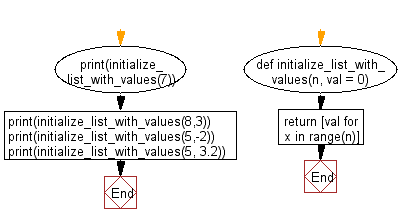Python: Initialize and fills a list with the specified value
Fill List with Specified Value
Write a Python program that fills a list with the specified value.
- Use a list comprehension and range() to generate a list of length equal to n, filled with the desired values.
- Omit val to use the default value of 0.
Sample Solution:
Python Code:
# Define a function 'initialize_list_with_values' that takes two arguments, 'n' and 'val'.
# The function creates a list containing 'n' elements, each initialized with the value 'val'.
def initialize_list_with_values(n, val=0):
return [val for x in range(n)]
# Call the 'initialize_list_with_values' function with different arguments to create lists.
# Example 1: Create a list with 7 elements, all initialized with the default value 0.
print(initialize_list_with_values(7))
# Example 2: Create a list with 8 elements, all initialized with the value 3.
print(initialize_list_with_values(8, 3))
# Example 3: Create a list with 5 elements, all initialized with the value -2.
print(initialize_list_with_values(5, -2))
# Example 4: Create a list with 5 elements, all initialized with the value 3.2.
print(initialize_list_with_values(5, 3.2))
Sample Output:
[0, 0, 0, 0, 0, 0, 0] [3, 3, 3, 3, 3, 3, 3, 3] [-2, -2, -2, -2, -2] [3.2, 3.2, 3.2, 3.2, 3.2]
Flowchart:

For more Practice: Solve these Related Problems:
- Write a Python program to create a list of a given length filled with a specified value and then update every third element to a different value.
- Write a Python program to generate a list filled with a specified value and then replace the middle element with the sum of the first and last elements.
- Write a Python program to fill a list with a specified value and then create a new list where each element is the product of its index and the specified value.
- Write a Python program to create a list of a specified size filled with a given value, and then reverse the list without changing the filled value.
Go to:
Previous: Write a Python program to calculate the sum of a list, after mapping each element to a value using the provided function.
Next: Write a Python program to get the n maximum elements from a given list of numbers.
Python Code Editor:
What is the difficulty level of this exercise?
Test your Programming skills with w3resource's quiz.
